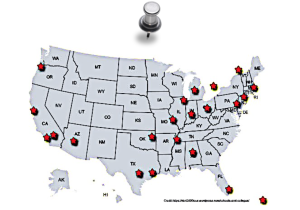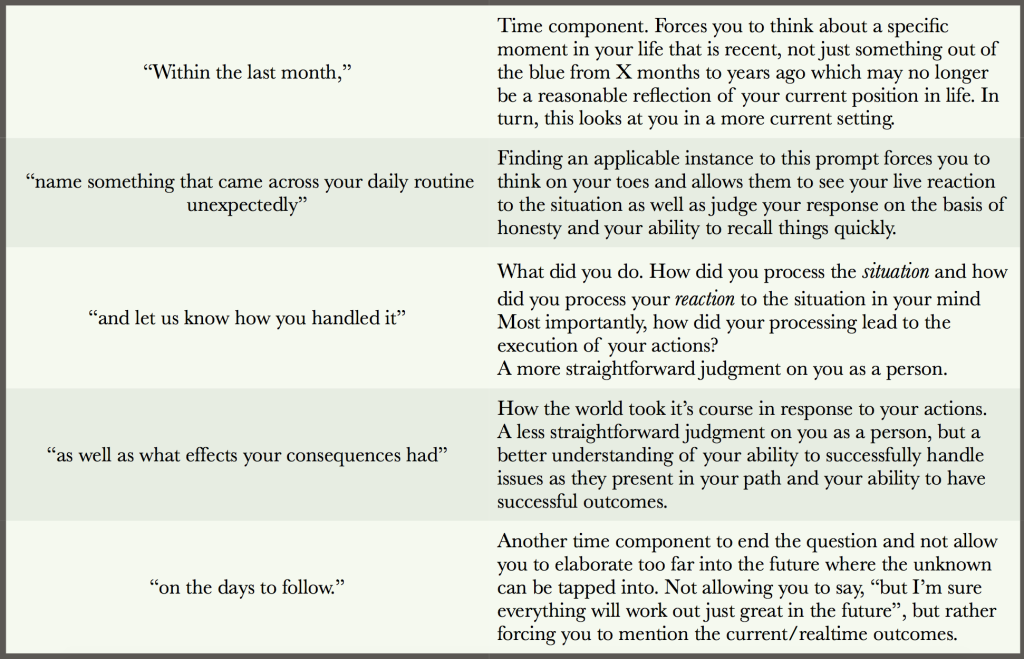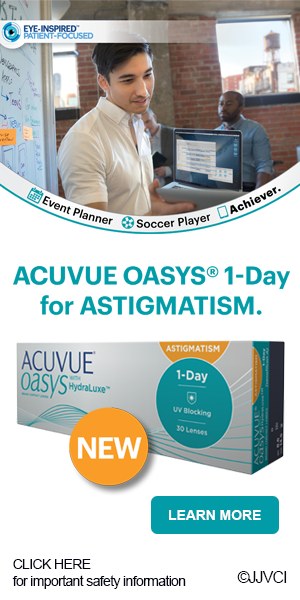 Within the last few years, the profession of Optometry has grown significantly. The scope of practice has expanded in certain states which now allows Optometrist to perform the more invasive laser and needle-suture procedures that were previously off limits. The job demand is on the rise and there is an inflated need for ODs in the country; potentially due to the aging population and the increase in prevalence of age related diseases that span across the board1. There are more people learning about the profession of optometry, more pre-optometry students graduating from undergraduate universities than ever before, and many other variables all leading to the current climate of the profession. More new schools have opened their doors within the last few years, while several others are still in the process.
Within the last few years, the profession of Optometry has grown significantly. The scope of practice has expanded in certain states which now allows Optometrist to perform the more invasive laser and needle-suture procedures that were previously off limits. The job demand is on the rise and there is an inflated need for ODs in the country; potentially due to the aging population and the increase in prevalence of age related diseases that span across the board1. There are more people learning about the profession of optometry, more pre-optometry students graduating from undergraduate universities than ever before, and many other variables all leading to the current climate of the profession. More new schools have opened their doors within the last few years, while several others are still in the process.
With the increasing number of programs to chose from, the process of selecting which schools to apply to, and which one to ultimately matriculate with has become more challenging and a more significant task than ever before. It’s imperative you do your research now to have greater chances of finding the right program for you that meets your expectations. Unfortunately, I know many colleagues across the country that are unhappy with their decision to attend the school that they have committed to. There doesn’t seem to be just one reason why they are unhappy, and each person has different goals and expectations, so the realm of their unease is typically deeper rooted within their individual wants and needs. I find that some of their qualms are smaller and less significant than others, while some are more legitimate reasons to express concern.
Although I could list the various neck-aches that have arisen from my decision to attend my first- choice Optometry school, I am also very happy and proud to be attend this beautiful campus everyday. When applying and interviewing, I made sure that my final program had the wants and needs that I required.

However, I was at an advantage when it came down to selecting which school to attend. I was able to make the best decision possible for my future based on my ability to ask the proper questions and get the answers I needed to hear, and doing so allowed me to make a well- informed choice about my line-up of prospective Alma Maters from each interview that I attended. I feel that I was also able to get really good feedback to confidently turn down other schools and select the best one for me… while I wonder about colleagues who claim to be dissatisfied.
To save you some time, I plan to give you the honest knowledge that you should have when applying to optometry school this round, or the next.
Consider the age of the program, the direction that the program is heading in, know that no two programs are equal, and that each and every college of Optometry will provide an experience that is unique to that location and setting. These are all good things. Besides that it makes things harder on the applicant, the diversity that is present within the various colleges can be considered as a huge benefit for the development and growth of our profession in general, providing multiple view points and methods to the science and art of practicing Optometry. However, as a prospective student, it is crucial that you do your research in order to know what you’re getting yourself into before you get there. Nearby patient population demographics is one thing to consider, I encourage you to find out if you will you have the opportunity to work on a variety of patient types from different age and race groups. Does the school specialize in managing a certain type of patient or condition within the perimeter of the clinic? Is the college located in a dense or rural area? Is the college a stand alone program or is it a part of a larger university system? What is the housing and transportation situation like?
Some programs may appear more established than they really are, while some may be in transition states that you may or may not want to be a part of during your clinical education. Keep in mind that newer programs will strive to appear well established, while schools that are expanding are going to strive to appear contemporary and progressive, and established schools are going to appear prestigious. Note that I am not saying new is bad, or change is bad, or that old is bad. There is no way you can possibly know the true in’s and out’s of a program until you are fully immersed in it; however you should do as much research as you can and ask as many questions as possible to find the best fit for your future. Every scenario will have its advantages and disadvantages. The goal here is to weigh which one is most important to you, which one do you want be involved with, and which do you want to avoid. It is just as true that those who shoot and aim for the moon may land upon the stars, as much as it is true that an ounce of prevention is worth a pound of cure.
A proactive student will do his/her own research about the program in advance of the application. I would start today by creating a timeline for yourself with a list of the important qualities that you look for in a strong educational program; make sure to include columns for ‘must haves’ and ‘must nots’. The next best thing you can do is to contact the school directly and either speak to a representative or an admissions counselor, speak with an upperclassman, and always make sure to speak with an alumnus from each campus.
Now, let’s fast forward and say you did the above and you didn’t find anything terrorizing enough to cause you to run as fast as you could in the opposite direction, you then submitted your application to your top 3-6 schools, and now you have interview dates scheduled with multiple schools – as will be the case with any competitive applicant. Here are some tips for you upcoming interview in order to help you find the best match- and no we aren’t talking boyfriends and girlfriends just yet 😉
The Questions You Should Ask in an Interview in Order to Make The Best Decision for Your Future
Let’s be honest, you are going to be asked the traditional questions that you probably already have answers to when interviewing, such as “Tell me about yourself”, “Where are you from?”, “What brings you to our campus?”, and “Why do you want to go to school here?”. If you don’t already have stellar answers ready for each of those listed above, I recommend you get the responses to those questions down pat as soon as possible- pull out some paper and write those down now. You should also prepare for the critical thinking questions that test how you work under pressure, such as “Tell us about a time that you were encountered with a difficult moment in your past requiring you to think outside of the box to resolve an issue.”
These are questions you will likely be asked, and these are questions you should be prepared to answer days to weeks in advance of any interview. It’s when you get questions slightly off the charts that really get you thinking on your toes, such as “Within the last month, name something that came across your daily routine unexpectedly, and let us know how you handled it as well as what effects your consequences had on the days that followed.”
This is a great question for many reasons. Lets break it down to see why this is a beefy question and how you can use the same style of question to learn about others. See the table below.
As you can see, the questions are deeply rooted to bring out the most in the interviewee, and any professional interviewer will know exactly how to grade the response you give.
The good news is, you can use the same logic above when looking for potential schools yourself!
Not only can you, but you should! You should, because as much as they interview you, you are also interviewing them, and you deserve to match with the best program for your future goals, personality, as well as any wants and needs that you may have.

A good interviewer will also acknowledge a good question when it is asked, and on top of giving you an honest and strong response, you might even earn some points at this part during the interview. I am not going to tell you what questions you should ask, as that should come from what is important to you, but I will give you the breakdown of what you need to know in order to ask the perfect question.
Keep in mind that all of the following questions have the same elements that were discussed in the question above, so when you ask your questions, know what to look for in the response to more accurately judge the interviewer. The chair is now yours.
1. Instead of “Typical”
Asking a question that states the word ‘typical’ sets you up for a let down. In reality, there is no such thing as a typical person or a typical day. ‘Typical’ is boring and nobody appreciates boring. Rather, ask pointed questions to get real responses to questions that actually matter to you.
• Don’t Ask: “What does the life of a typical first year look like?”
• Do Ask: “Is finals week different for each class year? If so, how do finals differ between the
first and second or third year classes? In which ways?”
- Do Ask any student on campus: “Would you mind telling me about you day yesterday? What did you do from hour to hour while you were on campus? ” and “ What does your day look like for tomorrow?”
- Do Ask anyone on campus: “If I were a 3rd year student today, what would would be on my schedule for tomorrow?”
2. Instead of asking “What is it like to be a student here”
Remember that inquiring about the culture and personality of the campus, as well as the vibe of the surrounding area, is very important. After all, you will be spending 4 full years in and out of the place. And yes different campuses will have different ‘personalities’. Keep in mind that the patients you will be seeing will be coming through those front doors. Keep in mind that others will visiting you at some point during your stay and keep in mind that you will become a representative of the community you are a part of, so make sure you are happy with the appearance of the campus vibe.
- Don’t Ask: “What is it like to be located in X City”
- Do Ask: “Tell me about the local events you have experienced in the area this last year”
- Do Ask: “Tell me about the culture of the campus on the weekends and where studentsstudy on Saturdays or Sundays”
- Do Ask multiple individuals that you see on campus: “How did you get here today and howlong did it take you? Which route did you use? Is that normal or was today different?”
3. Instead of “Like”
This one a is tough one, and I’ll be the first to admit that I will over do it sometimes (I did say I was going to be honest), but using the word “like” too often, is a down fall to your presentation as a great applicant. It’s as if you were using the word “umm” too many times during a presentation. Find something else to say in place of the word. If you’re anything parallel to me, chances are you only using it to buy you time while you think of something else to say, and many times your sentences could probably do without it! Kick this one out by being better prepared for the big day. Start practicing now by pinching yourself each time you say the word unnecessarily. This isn’t going to make you or break you, but let’s do our best here ;).
I encourage you to find the best school for you. Put in the work now so that in the end there will be less room to complain and more time to enjoy what you are studying and to be excited about the growth of optometry and your education alongside the growth of the profession. Ask the proper questions and interview like a champ! This will put you in the lead and give you room
pick and chose from the various programs based on what you see as important. Try not to sweat the small stuff, no school is perfect.
Most importantly, keep in mind that no matter which school you graduate from, you will be a great doctor because the majority of what you get out of school is all on you and the amount of time you put into becoming a great clinician… I’m just making sure that by the time graduation day comes along, you can happily say that you chose the best program for you- with an ear to ear grin and all 😉
Citations
1. Brüünsgaard, Helle, and Bente Klarlund Pedersen. “Age-related Inflammatory Cytokines and Disease.” Immunology and Allergy
Clinics of North America: 15-39. Print.
Written by Optometry Student Mario Cruz.
Mario graduated from The University of Nevada- Reno, and is now attending the Southern California College of Optometry. He shares his insider knowledge on what it’s like being the self proclaimed most-happy-go-lucky-optometry-dude he knows. Mario looks forward to a successful career as an Optometrist and someday becoming Provost of his hometown university and Majority Leader of the Senate. He also looks forward to someday meeting “Average Joe” and staging a stand off for self comparison purposes. More importantly, he looks to help you during your transition to Optometry school.. and beyond.





